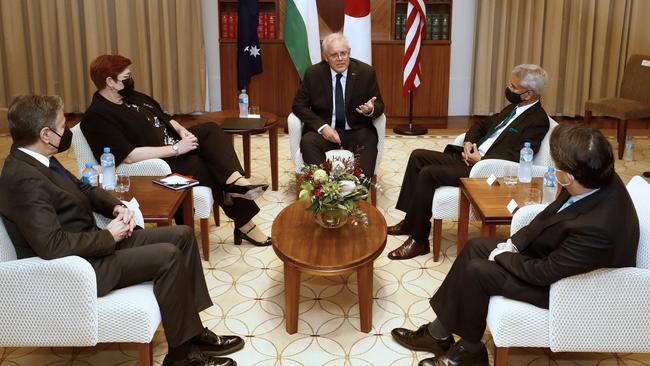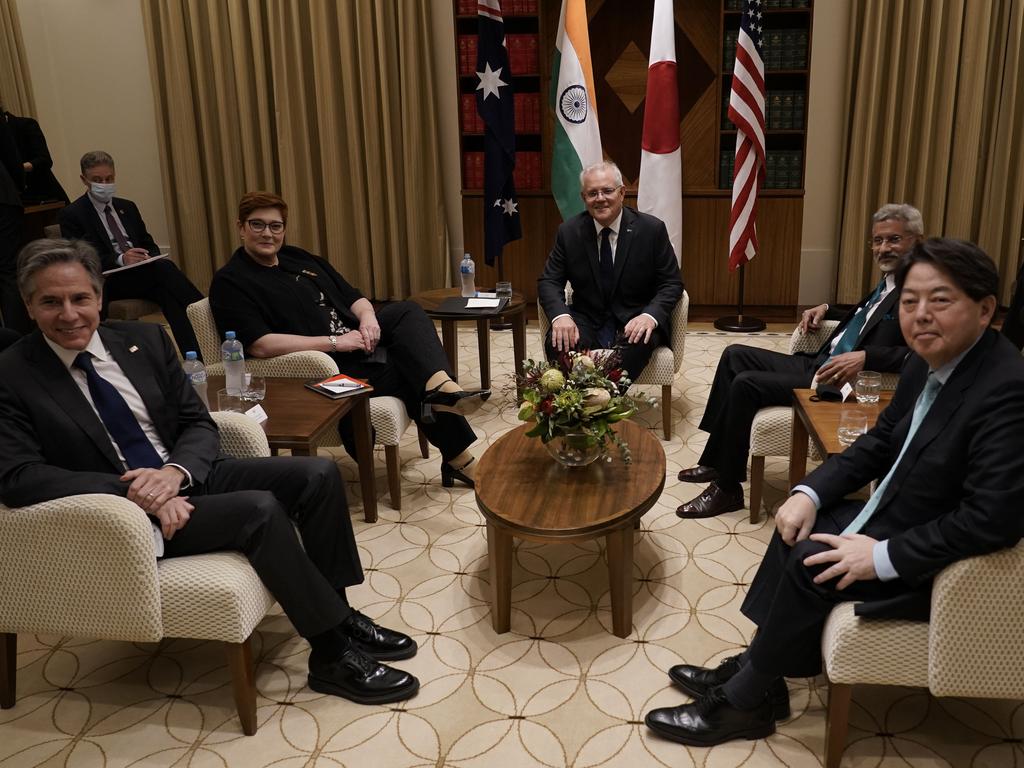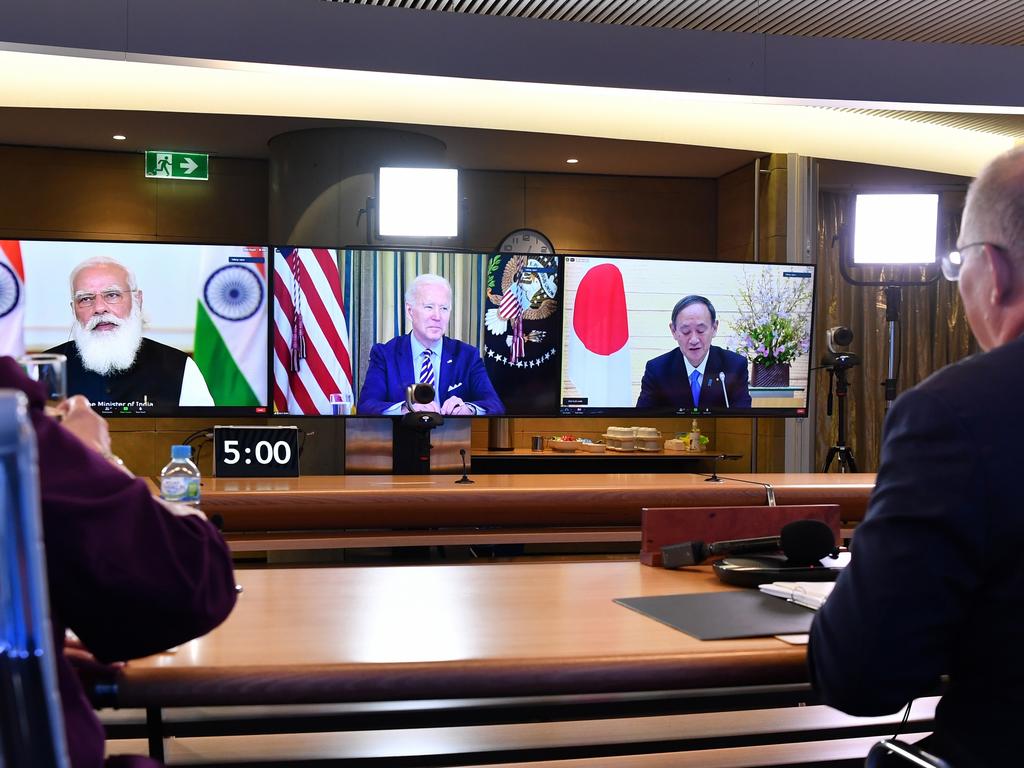Quad pledges to counter China maritime aggression
Australia, the US, Japan and India have vowed to ensure freedom of navigation in the East and South China Seas to counter Chinese maritime aggression.

Australia, the US, Japan and India have vowed greater co-operation to ensure freedom of navigation in the East and South China Seas to counter Chinese maritime aggression, and pledged to work more closely with Indo-Pacific nations to help them protect their offshore resources.
In a meeting of the Quadrilateral Security Dialogue in Melbourne, Foreign Minister Marise Payne, US Secretary of State Antony Blinken, India’s Subrahmanyam Jaishankar and Japan’s Yoshimasa Hayashi, also reaffirmed their support for a free Taiwan.
They pledged to work more closely to oppose Chinese disinformation and cyber attacks and secure undersea cables.
Mr Blinken highlighted the US pivot to the Indo-Pacific during the meeting, saying his presence in Australia during the Ukraine crisis underscored US resolve to ensure the region remained free and open. “Indeed, these efforts are part of one whole,” Mr Blinken said. “One of the reasons we are working so intensively to defend the core principles threatened by Russia in Ukraine, is because those very same principles are crucial to enduring stability in this region and every other part of the world.”
The Quad ministers also expressed deep concern over the military dictatorship in Myanmar, backing ASEAN’s plan to resolve the crisis, and condemned North Korea’s “destabilising” ballistic missile launches.
“Quad partners champion the free, open, and inclusive rules-based order, rooted in international law, that protects the sovereignty and territorial integrity of regional countries,” the ministers said in a joint statement.
Japan, which will host a Quad leaders’ meeting by mid-year, expressed particular concern over Chinese activities in the East and South China Seas, which Beijing treats as its own sovereign waters.
Mr Hayashi said: “I expressed serious concerns about the unilateral attempts to alter the status quo (in the seas) by force … and the four foreign ministers agreed to work together to counter the challenges against the maritime order.”
In an interview with The Weekend Australian, Mr Hayashi said China’s military build-up and aggressive behaviour in the region were increasingly worrying. “Chinese military trends, combined with insufficient transparency on its defence politics and military affairs, have become a matter of grave concern to the region, including Japan and the international community,” he said.
Mr Hayashi also provided explicit endorsement of the trilateral AUKUS agreement between Australia, the US and UK, and declared Australia’s acquisition of nuclear submarines would be “an important initiative for the security of the Indo-Pacific“.
In the joint Quad statement, the ministers committed to “deepen engagement with regional partners, including through capacity-building and technical assistance, to strengthen maritime domain awareness” and protect nations’ ability to develop offshore resources consistent with the UN Law of the Seas.
The ministers also backed Australia’s pushback against Chinese economic coercion, pledging to “work collectively to foster global economic resilience against such actions”.
They denounced violent extremism in the region and urged countries to work together to eliminate terrorist safe havens and disrupt terrorist networks.
Senator Payne said Australia supported a world order that favoured freedom, “where rules, not power and coercion, resolve disputes”.
“Today, in Melbourne, our overarching focus was on the Indo-Pacific,” the Foreign Minister said. “We agreed to strengthen Quad cyber and counter-terrorism co-operation, including by co-ordinating efforts to address the threat of ransomware.
“We discussed humanitarian and disaster response and vital infrastructure delivery, which is climate adapted and resilient, in consultation with our partners.
“We agreed to boost maritime security support for Indo-Pacific partners to strengthen their awareness and ability to develop offshore resources to ensure freedom of navigation and overflight and to combat challenges such as illegal fishing.”
Dr Jaishankar said the Quad was working on an agenda to make the grouping “a force for global good”. But he signalled India, whose country has a close relationship with Russia, was uncomfortable with discussion of the Ukraine crisis in the regional forum. “This meeting is focused on the Indo-Pacific so I think you should figure out the geography there,” he said.
Earlier, the ministers met Scott Morrison, who said the Quad was vital to the defence of freedom in a “fragile, fragmented and contested world”.
“I think in doing so, we stand up to those who would seek to coerce us,” the Prime Minister said
He noted the Quad’s support for Australia in the face of Chinese economic coercion.
“I’m reassured by the incredible strong support that Australia has received by our Quad partners and I just don’t mean in a security context,” Mr Morrison said.
“I mean that in terms of our economic partnership and co-operation; I mean that in our humanitarian partnership; I mean that in terms of how each of us stands for a world order that favours freedom and particularly here in a free and open Indo-Pacific.”
Mr Blinken said a confrontation with China in the Indo-Pacific was not inevitable, though the US was concerned about Chinese aggression in the region. But despite the bloc’s aim to be a counterweight to China, Mr Blinken said the Quad should be defined “not by what we are against but by what we are for”.
“What we are for quite simply is a free and open Indo-Pacific,” he said. “People deserve to live freely; countries deserve to work together freely and associate with whom they choose.”
Anthony Albanese and his foreign affairs spokeswoman Penny Wong also met the Quad Foreign Ministers, and had private talks with Mr Blinken. He used the occasion to reiterate Labor’s strong support for the trilateral AUKUS alliance with the US and UK, and its support for Australia to get nuclear submarines.






To join the conversation, please log in. Don't have an account? Register
Join the conversation, you are commenting as Logout